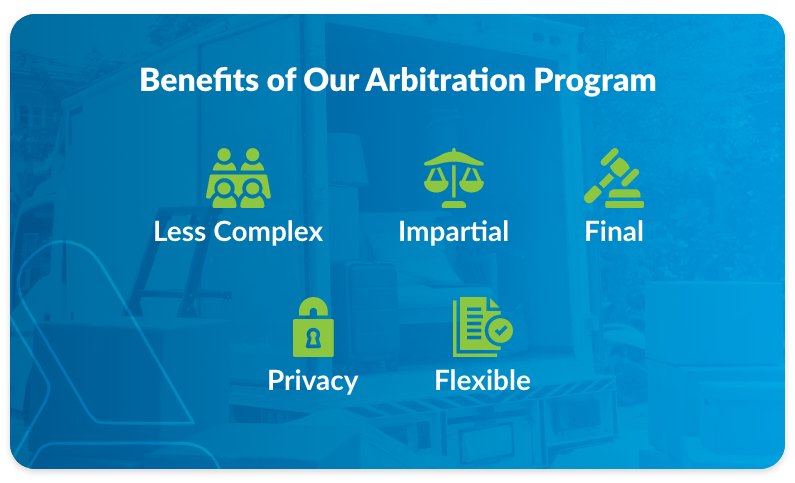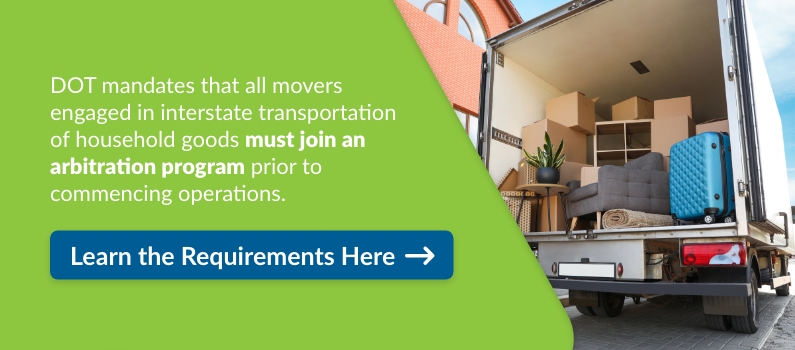
Guide to Arbitration for Moving Companies
Disputes between businesses and customers are commonplace in many industries, and the moving industry is no exception. The moving process can result in lost or damaged goods, leading to complaints from angry customers.
Federal law requires arbitration for moving companies when customer disputes arise. The Federal Motor Carrier Safety Administration (FMSCA) also stipulates that interstate moving businesses wishing to renew their license and Motor Carrier Number with the U.S. Department of Transportation (DOT) must show proof of participation in an approved arbitration program for resolving consumer complaints.
Business Consumer Alliance (BCA) helps companies comply with arbitration laws and processes while maintaining daily operations. We help you understand arbitration requirements to resolve disputes as needed.
What Is Arbitration?
Arbitration is a legal process designed to expedite the claims resolution process. A neutral third party, known as an arbitrator, reviews the facts and information submitted by both sides and renders a final, binding decision. The arbitration procedure is quicker than court proceedings and saves both parties money in attorney and legal fees.
Other benefits of arbitration include:

- Less complex: The arbitration process is less complicated than a court trial. Litigation requires filing multiple documents and motions and attending numerous hearings. Arbitration features simplified rules of evidence and a more streamlined hearing process.
- Impartial: Both sides pick the arbitrator that will hear the case. This mutual consent reduces the likelihood that one party will believe the ruling is biased or unfair.
- Final: Arbitration has limited options for filing an appeal. In most cases, the arbitrator's decision is final, and both sides can move on with their lives. In contrast, appeals of a court trial verdict may drag on indefinitely.
- Privacy: The accusations levied during a public trial could damage a moving company's reputation, even if they are proven false later. Arbitration proceedings are private, and the information and arguments presented by both sides remain confidential.
- Flexible: In a trial situation, both sides are at the mercy of the court docket, which could lead to scheduling issues for busy moving companies. Arbitration hearings offer more convenience, as the parties can submit written documents to the arbitrator for review.
What Is the Legal Arbitration Requirement for Moving Companies?
Unlike many industries where the process is voluntary, moving companies must participate in binding arbitration. The DOT requires all movers involved in the interstate shipment of household goods must enroll in an arbitration program before launching their business. The DOT instituted this rule to provide an alternative to litigation in Federal Court when resolving moving-related damage claims and monetary disputes.
Moving companies participating in an approved arbitration program receive a certificate from the provider, which they must display on a wall or another prominent area of their headquarters or facility. They must also renew the program or enroll with another qualified provider yearly.
Moving companies that do not engage in interstate transportation should also consider having an arbitration clause, even though the law does not require it. It will expedite the claim resolution process and save the time, money, and frustration associated with the court and litigation process.

What Should an Arbitration Program Include?
Under federal law 49 CFR § 375.211, the arbitration program for movers must consist of the following elements:
- Your program design must prevent your business from having any unique or unfair advantages over the claimant.
- You must offer notification of access to third-party arbitration before executing a bill of lading.
- Upon request, your company must provide the necessary forms and information required for commencing an action for dispute resolution under arbitration.
- Any person you choose to arbitrate must be unaffiliated with the parties involved in the dispute to avoid a conflict of interest.
- You must agree to arbitration in situations involving claims of $10,000 or less. You may refuse to participate in the process for claims exceeding $10,000. Claimants must then initiate legal action if they wish to pursue the matter.
- You agree that the arbitrator may determine which party must pay some or all the costs of the arbitration proceeding.
- Upon the agreement of all parties, the arbitrator may allow oral presentations of the disputes by any parties or their representatives.
- The arbitrator must decide no later than 60 days after receiving a written dispute notification. The arbitrator may lengthen this period if a party fails to provide essential information promptly.
How Does the Arbitration Process Work?
Arbitration for moving companies is a straightforward process. Customers who dispute with a mover should first attempt to resolve the issue by contacting the company. If they are dissatisfied or cannot reach an agreement, they must notify the mover to request arbitration, which it must agree to if the claim is less than or equal to $10,000. Both sides then select an arbitrator to review the case.
Arbitration hearings typically do not require in-person attendance by the mover or claimant. Both parties submit their supporting documentation to Business Consumer Alliance (BCA), which serves as the administrator. BCA will then forward the documents to the arbitrator assigned to the case who will review and decide on the matter.
The chosen arbitrator will determine whether the mover owes the customer any money and how much. The arbitrator will notify both parties of the decision in writing.

Can a Mover Be at Risk Without an Arbitration Program?
Interstate moving companies that decide to forgo an arbitration program leave themselves vulnerable. Your business could receive a hefty fine if an audit or inspection uncovers a 49 CFR § 375.211 violation. You also won't have the option of settling a case quickly and discreetly instead of going through an expensive, prolonged court trial.
Why Choose BCA?
BCA is a nonprofit organization whose mission is promoting business self-regulation. We offer a comprehensive arbitration program for movers to help your company resolve disputes quickly, efficiently, and affordably. We also help you comply with federal law, protecting your business and giving you more peace of mind.
Becoming a BCA member also includes other premium services for your moving business, like access to legal advice and an attorney, help collecting unpaid invoices, human resources assistance, and a customer feedback program to bolster your company's online reputation.
Contact us to learn more about our arbitration program for movers and the advantages of a BCA membership today.
Join Our Arbitration Program